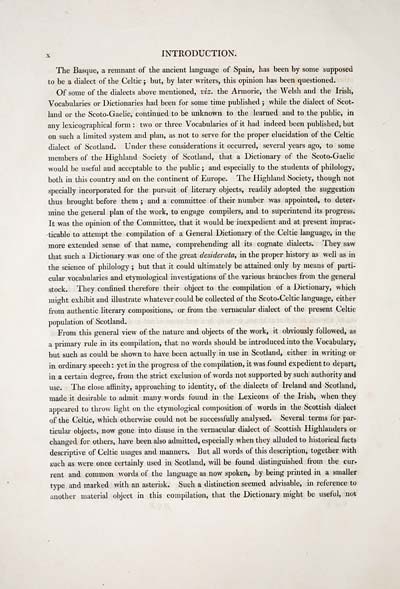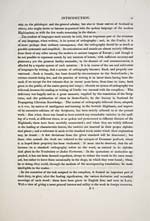Download files
Complete book:
Individual page:
Thumbnail gallery: Grid view | List view

X INTRODUCTION.
The Basque, a remnant of the ancient language of Spain, has been by some supposed
to be a dialect of the Celtic j but, by later writers, this opinion has been questioned.
Of some of the dialects above mentioned, viz. the Armoric, the Welsh and the Irish,
Vocabularies or Dictionaries had been for some time published ; while the dialect of Scot-
land or the Scoto-Gaelic, continued to be unknown to the learned and to the public, in
any lexicographical form : two or three Vocabularies of it had indeed been published, but
on such a limited system and plan, as not to serve for the proper elucidation of the Celtic
dialect of Scotland. Under these considerations it occurred, several years ago, to some
members of the Highland Society of Scotland, that a Dictionary of the Scoto-Gaelic
would be useful and acceptable to the public ; and especially to the students of philology,
both in this country and on the continent of Europe. The Highland Society, though not
specially incorporated for the pursuit of literary objects, readily adopted the suggestion
thus brought before them ; and a committee of their number was appointed, to deter-
mine the general plan of the work, to engage compilers, and to superintend its progress.
It was the opinion of the Committee, that it would be inexpedient and at present imprac-
ticable to attempt the compilation of a General Dictionary of the Celtic language, in the
more extended sense of that name, comprehending all its cognate dialects. They saw
that such a Dictionary was one of the gi-eat desiderata, in the proper history as well as in
the science of philology ; but that it could ultimately be attained only by means of parti-
cular vocabularies and etymological investigations of the various branches from the general
stock. They confined therefore their object to the compilation of a Dictionary, which
niio'ht exhibit and illustrate whatever could be collected of the Scoto-Celtic language, either
from authentic literary compositions, or from the vernacular dialect of the present Celtic
population of Scotland.
From this general view of the nature and objects of the work, it obviously followed, as
a primary rule in its compilation, that no words should be introduced into the Vocabulary,
but such as could be shown to have been actually in use in Scotland, either in writing or
in ordinary speech: yet in the progress of the compilation, it was found expedient to depart,
in a certain degree, from the strict exclusion of words not supported by such authority and
use. The close affinity, approaching to identity, of the dialects of Ireland and Scotland,
made it desirable to admit many words found in the Lexicons of the Irish, when they
appeared to throw light on the etymological composition of words in the Scottish dialect
of the Celtic, which otherwise could not be successfully analysed. Several terms for par-
ticular objects, now gone into disuse in the vernacular dialect of Scottish Highlanders or
changed for others, have been also admitted, especially when they alluded to historical facts
descriptive of Celtic usages and manners. But all words of this description, together with
such as were once certainly used in Scotland, will be found distinguished from the cur-
rent and common words of the language as now spoken, by being printed in a smaller
type and marked with an asterisk. Such a distinction seemed advisable, in reference to
another material object in this compilation, that the Dictionary might be useful, not
The Basque, a remnant of the ancient language of Spain, has been by some supposed
to be a dialect of the Celtic j but, by later writers, this opinion has been questioned.
Of some of the dialects above mentioned, viz. the Armoric, the Welsh and the Irish,
Vocabularies or Dictionaries had been for some time published ; while the dialect of Scot-
land or the Scoto-Gaelic, continued to be unknown to the learned and to the public, in
any lexicographical form : two or three Vocabularies of it had indeed been published, but
on such a limited system and plan, as not to serve for the proper elucidation of the Celtic
dialect of Scotland. Under these considerations it occurred, several years ago, to some
members of the Highland Society of Scotland, that a Dictionary of the Scoto-Gaelic
would be useful and acceptable to the public ; and especially to the students of philology,
both in this country and on the continent of Europe. The Highland Society, though not
specially incorporated for the pursuit of literary objects, readily adopted the suggestion
thus brought before them ; and a committee of their number was appointed, to deter-
mine the general plan of the work, to engage compilers, and to superintend its progress.
It was the opinion of the Committee, that it would be inexpedient and at present imprac-
ticable to attempt the compilation of a General Dictionary of the Celtic language, in the
more extended sense of that name, comprehending all its cognate dialects. They saw
that such a Dictionary was one of the gi-eat desiderata, in the proper history as well as in
the science of philology ; but that it could ultimately be attained only by means of parti-
cular vocabularies and etymological investigations of the various branches from the general
stock. They confined therefore their object to the compilation of a Dictionary, which
niio'ht exhibit and illustrate whatever could be collected of the Scoto-Celtic language, either
from authentic literary compositions, or from the vernacular dialect of the present Celtic
population of Scotland.
From this general view of the nature and objects of the work, it obviously followed, as
a primary rule in its compilation, that no words should be introduced into the Vocabulary,
but such as could be shown to have been actually in use in Scotland, either in writing or
in ordinary speech: yet in the progress of the compilation, it was found expedient to depart,
in a certain degree, from the strict exclusion of words not supported by such authority and
use. The close affinity, approaching to identity, of the dialects of Ireland and Scotland,
made it desirable to admit many words found in the Lexicons of the Irish, when they
appeared to throw light on the etymological composition of words in the Scottish dialect
of the Celtic, which otherwise could not be successfully analysed. Several terms for par-
ticular objects, now gone into disuse in the vernacular dialect of Scottish Highlanders or
changed for others, have been also admitted, especially when they alluded to historical facts
descriptive of Celtic usages and manners. But all words of this description, together with
such as were once certainly used in Scotland, will be found distinguished from the cur-
rent and common words of the language as now spoken, by being printed in a smaller
type and marked with an asterisk. Such a distinction seemed advisable, in reference to
another material object in this compilation, that the Dictionary might be useful, not
Set display mode to: Large image | Transcription
Images and transcriptions on this page, including medium image downloads, may be used under the Creative Commons Attribution 4.0 International Licence unless otherwise stated. ![]()
| Early Gaelic Book Collections > Blair Collection > Dictionarium scoto-celticum > Volume I > (16) |
|---|
| Permanent URL | https://digital.nls.uk/76575753 |
|---|
| Description | Lacks half title page in Volume 1. |
|---|---|
| Attribution and copyright: |
|
| Description | A selection of books from a collection of more than 500 titles, mostly on religious and literary topics. Also includes some material dealing with other Celtic languages and societies. Collection created towards the end of the 19th century by Lady Evelyn Stewart Murray. |
|---|
| Description | Selected items from five 'Special and Named Printed Collections'. Includes books in Gaelic and other Celtic languages, works about the Gaels, their languages, literature, culture and history. |
|---|

